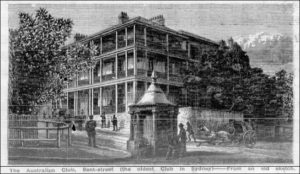THE AUSTRALIAN CLUB, Sydney
Yesterday saw another relic of bygone times pass away, for the levelling work at the corner of O’Connell and Spring streets was continued, and now every vestige of the Australian Club, afterwards the Pulteney Hotel, has vanished. The old fig-tree, apparently half a century old, which has been a well-known landmark and an ornament for so long, was ruthlessly cut do wn to make way for a large warehouse. Many people were attracted by the falling tree, and it was sorrowful to see the place littered with the branches and cut-up trunk of the once noble relic. Opposite are some still more aged trees, who look as though they would soon join the ‘majority.’ The chief reason that this tree is being noticed is that it stood for so long in the yard of the Australian Club, a rather ugly building, which is just as well abolished as an ornament, but which has many an interesting tale told of it.
wn to make way for a large warehouse. Many people were attracted by the falling tree, and it was sorrowful to see the place littered with the branches and cut-up trunk of the once noble relic. Opposite are some still more aged trees, who look as though they would soon join the ‘majority.’ The chief reason that this tree is being noticed is that it stood for so long in the yard of the Australian Club, a rather ugly building, which is just as well abolished as an ornament, but which has many an interesting tale told of it.
The Australian Club was established in 1838, and was the first thing of the kind in Sydney. Its aims were to ‘pro-mote social and literary intercourse, and to provide for the general interest and comfort of country gentlemen.’ It was a comfortable, home-like club, that had no politics to speak of, and invited all kinds of members. Before the discovery of gold the supervision over the roll of members was very severe; but riches proved so levelling that the vigilance had to be relaxed, for when a ‘no-body’ became lionised for his nuggets, even by governors, what club could keep its door shut? Again, if a member lost his position by ill-luck, and had to become a ‘tradesman,’ he still kept to his club. Thus all who followed in his line were eligible for membership, and so, by degrees this club’s scope grew wider, till the original design was quite lost sight of. The folks in those days thought it quite odd that beds should be provided, but it was simply an innovation for country members.
Among the rules formed in 1838 were these: ‘That economy be attended to as well as comfort; that no game of loo, etc, be permitted, no dice be used (except for backgammon), nor any higher stakes than half-crown points, nor any bet exceeding ten shillings a rubber, under pain of expulsion.’ Any article that was broken had to be paid for at double its rate. One rule says: ‘No provisions cooked in the clubhouse, and no wines or liquors shall be sent out of the house for the use of members, nor shall any person not a member be permitted to have refreshment at the clubhouse.’ A clause that reflects somewhat on our ancestors ran: ‘All members to pay bills before leaving the clubhouse, the steward having positive orders not to open an account with any individual.’ The rules about ‘complaints’ and taking by mistake books, etc., are still the same, and ever will be. The club became the Pulteney Hotel later on, when it was referred to as one of the ‘most respectable and elegant structures — the exterior having a fine appearance from the water; its interior arrangements are simple, and would do honor to any provincial town in Great Britain.’ Many people remember happy evenings spent in the big ball room here, nearly all public meetings and many pleasure gatherings were held in the same place; so that this corner must have many pleasant memories clinging round it. The old folks now love to talk over the early forties, when they were young fellows, and met nightly at the ‘club’. O’Connell-street, Bent-street, etc.,’ were considered quite suburban in 1838, where ‘elegant edifices arose, the homes of the most respectable families in town,’ surrounded with gardens, and fine trees, giving quite an air of ‘rustic grandeur’ to quote an ancient authority. It was about this time that Circular Quay was formed, that gas was introduced, that steamers began to run, that theatrical matters sprang into real life, that exports arrived at the sum of one million sterling; so that ‘the tastes, pursuits, comforts, and even elegances of English society were valued and enjoyed even more than in the largest towns in England.’ This aged tree, had it tongues in all its leaves, could tell much more, but — perhaps, it is just as well it cannot talk.
Evening News Sydney, Wednesday 21 September 1898
Letter to Editor: THE AUSTRALIAN CLUB.
To the Editor of the ‘Evening News.
Sir, — The paragraph, in your paper of to-day upon the old Australian Club will perpetuate an error if not corrected, and it is as well to be accurate even in trivial matters, especially when they become historical. It states in two places that the club was subsequently the Pulteney Hotel. Quite the reverse was the case, It was the Hotel by this name up to the early part of 1838; and kept by one Levien, who was an applicant for the stewardship of the club, then about to be formed. The owner of the property was the elder Manning, Curator of Intestate Estates. It was let or sold by him for the club, established, according to their rules, on the 24th May, 1838. The disappearance of the building reminds one of the prophecy of ‘the Temple’ — ‘There sha
ll not be left one stone upon another that shall not be thrown down,’ for there is not a vestige of it left; a fit. but melancholy, sequel to the career of some of its original members, who were in their day ‘towers of strength,’ and the most distinguished people in the community. — Yours, etc; S.M.M September
